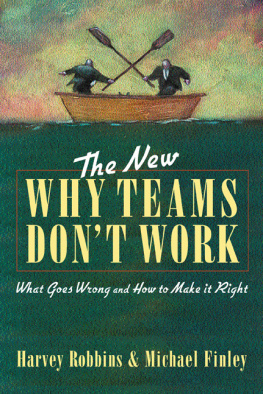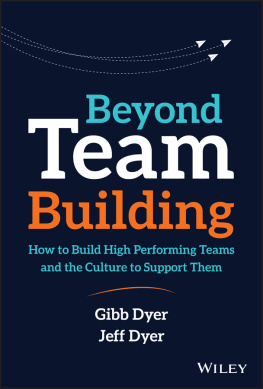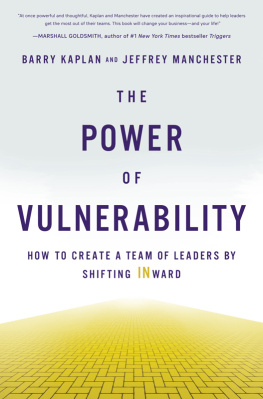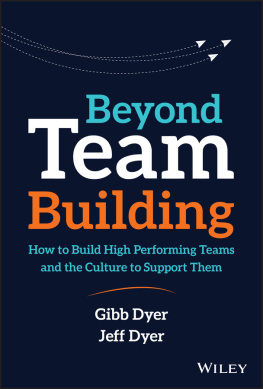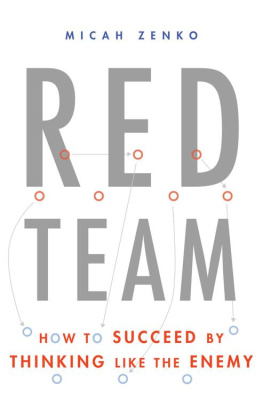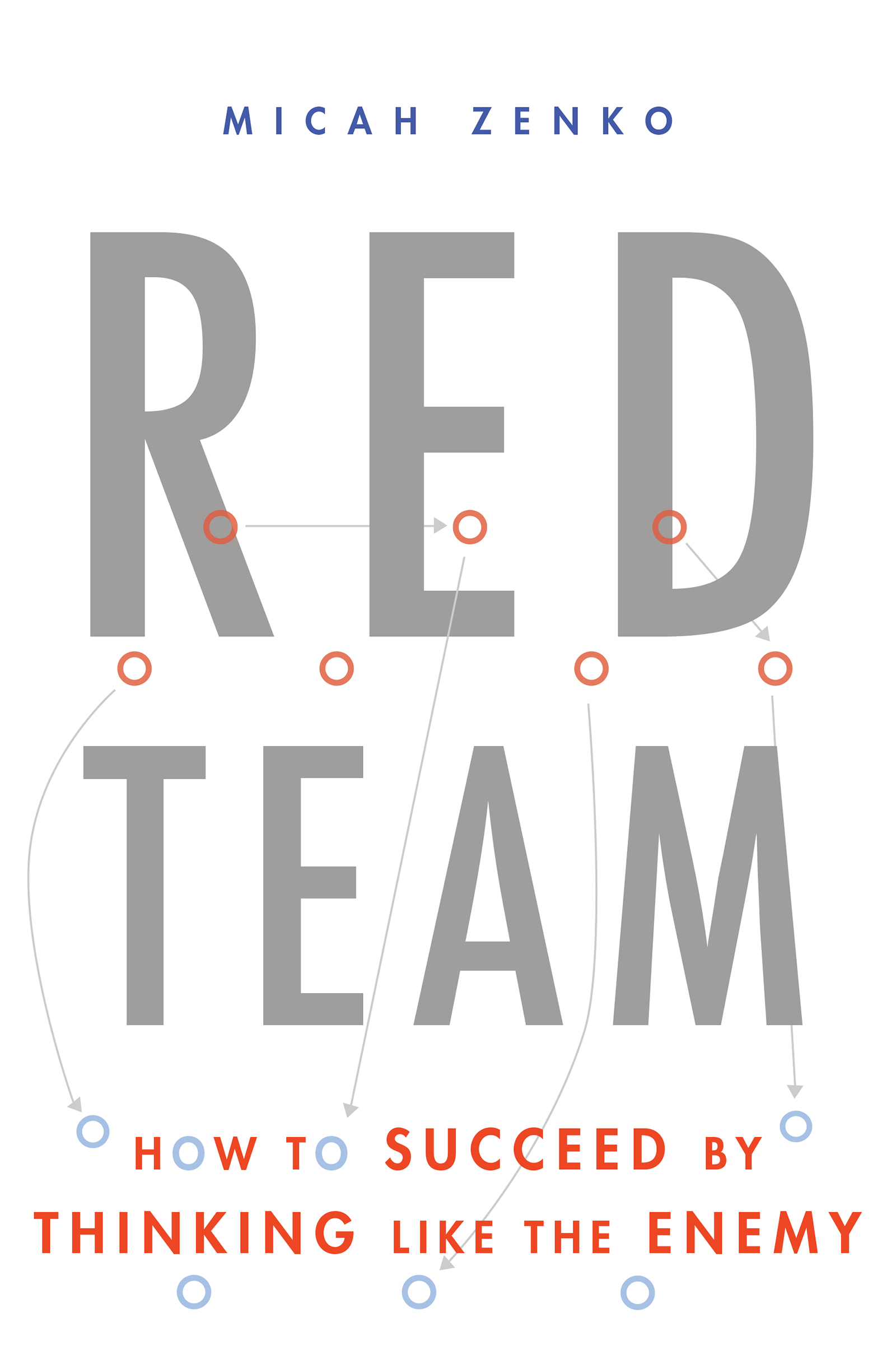A Member of the Perseus Books Group
New York
Copyright 2015 by Micah Zenko
Published by Basic Books, A Member of the Perseus Books Group
All rights reserved. Printed in the United States of America. No part of this book may be reproduced in any manner whatsoever without written permission except in the case of brief quotations embodied in critical articles and reviews. For information, contact Basic Books, 250 West 57th Street, New York, NY 10107.
Books published by Basic Books are available at special discounts for bulk purchases in the United States by corporations, institutions, and other organizations. For more information, please contact the Special Markets Department at the Perseus Books Group, 2300 Chestnut Street, Suite 200, Philadelphia, PA 19103, or call (800) 810-4145, ext. 5000, or e-mail special.markets@perseusbooks.com.
A Council on Foreign Relations Book
Designed by Pauline Brown
Library of Congress Cataloging-in-Publication Data
Zenko, Micah.
Red team : how to succeed by thinking like the enemy / Micah Zenko.
pages cm
Includes bibliographical references and index.
ISBN 978-0-465-07395-5 (ebook) 1. Success in business. 2. Risk management. 3. Private security services. 4. Competition. I. Title.
HF5386.Z46 2015
658.4'01dc23
2015015268
10 9 8 7 6 5 4 3 2 1
The Council on Foreign Relations (CFR) is an independent, nonpartisan membership organization, think tank, and publisher dedicated to being a resource for its members, government officials, business executives, journalists, educators and students, civic and religious leaders, and other interested citizens in order to help them better understand the world and the foreign policy choices facing the United States and other countries. Founded in 1921, CFR carries out its mission by maintaining a diverse membership, with special programs to promote interest and develop expertise in the next generation of foreign policy leaders; convening meetings at its headquarters in New York and in Washington, DC, and other cities where senior government officials, members of Congress, global leaders, and prominent thinkers come together with CFR members to discuss and debate major international issues; supporting a Studies Program that fosters independent research, enabling CFR scholars to produce articles, reports, and books and hold roundtables that analyze foreign policy issues and make concrete policy recommendations; publishing Foreign Affairs , the preeminent journal on international affairs and US foreign policy; sponsoring Independent Task Forces that produce reports with both findings and policy prescriptions on the most important foreign policy topics; and providing up-to-date information and analysis about world events and American foreign policy on its website, www.cfr.org.
The Council on Foreign Relations takes no institutional positions on policy issues and has no affiliation with the US government. All views expressed in its publications and on its website are the sole responsibility of the author or authors.
Contents
Within the Roman Catholic Church, the formal title was the Promotor Fidei , or Promoter of the Faith. More commonly, the position became known within the Church and the laity as the Advocatus Diaboli , or Devils Advocate. Today, the term applies to anyone who is a skeptic, or takes an unpopular or contrary position for the sake of argument alone. A professor who provokes discussion by countering students assumptions, a trial attorney attempting to predict opposing counsels arguments, or simply a crankall might be branded devils advocates according to the more flexible understanding of the term. Within the Catholic Church, however, the role of the Devils Advocate emerged as a clearly defined position with a specific responsibility: to challenge the purported virtues and miracles of nominees for sainthood.
During its first thousand years, the Churchs saint-making process had been relatively haphazard and decentralized. Local Christian communities could assign sainthood based on vox populi , or popular sentiment, and they avidly awarded the title to those who had died as a martyr, to some who had greatly professed their faith, or even to those who had done little more than live a particularly pious life. The result was an explosion of locally proclaimed saints.
In an effort to add rigor to the process in the fifth century, bishops began to require written vitae documentation of the life, virtues, and miracles of candidatesin order for someone to be considered for sainthood. However, those vitae were largely based on local gossip and hearsay, with little examination and verification of testimonies. As late as the ninth century, the canonization process, as one scholar described it, was still essentially, as it had been in the second century, the spontaneous Vatican officials perceived that allowing sainthood to be determined by the whims of vox populi was becoming a threat to the central authority of the Church.
By the thirteenth century, popes sought to exert greater direct control over the canonization process in an effort to consolidate power within the Vatican and protect the sanctity and legitimacy of sainthood. In 1234, Pope Gregory IXbest known for establishing the Inquisition to confront alleged hereticsdecreed that the papacy had absolute jurisdiction over all aspects of the canonization process. Under subsequent reforms, the framework, standards, and procedures of determining sainthood were formalized and centralized within the Sacred Congregation of Rites, the Vaticans committee of cardinals that oversaw and vetted all papal canonizations. In the process, the Devils Advocate was born.
The Church authorities introduced the position of the Advocatus Diaboli to serve as an independent investigator and designated dissenter. It would be his job to provide point-by-point objections to all evidence presented on behalf of the candidate, and to detail all the unfavorable evidence in a written summary. Throughout a canonization process that could last decades, corroborating details and objections alike were presented to the sacred Congregation, and ultimately to the pope, before final approval could be granted. Thus, Pope Gregory IX made clear to everyone the need for the position of Devils Advocate, a knowledgeable insider who was empowered to step outside of the Church and objectively assess each candidate for sainthood.
For centuries, these reforms kept the process in check. In 1781, Scottish physician and author John Moore published an account of an abbreviated canonization debate that he witnessed as a tourist in the Vatican:
The business is carried on in the manner of a lawsuit. The Devil is supposed to have an interest in preventing men from being made Saints. That all justice may be done, and that Satan may have his due, an advocate is employed to plead against the pretensions of the Saint Expectant, and the person thus employed is denominated by the people, the Devils Advocate. He calls in question the miracles
Over time, the Devils Advocate was transformed from a formal ecclesiastical position into a commonplace figure of speech used to describe an argumentative person, and soon enough, the Vaticans most senior official decided that the position had outlived its usefulness. In 1983, in an effort to streamline the canonization process, Pope John Paul II issued an Apostolic Constitution reducing the number of miracles required from four to two, and eliminating the office of the Devils Advocate. The reforms were intended to foster a more cooperative spirit by making the process simpler, faster, and far less adversarial. Subsequently, Pope John Paul II produced more beatifications (1,338) and canonizations (482) in some twenty years than all of his 263 predecessors combined over almost two thousand years. By eradicating this centuries-old institutional check on saint-making, the integrity associated with the process and outcome was negated as well. Yet, even though the Vatican eventually abandoned the position, the enduring value of its thirteenth-century innovation should not be forgotten.


